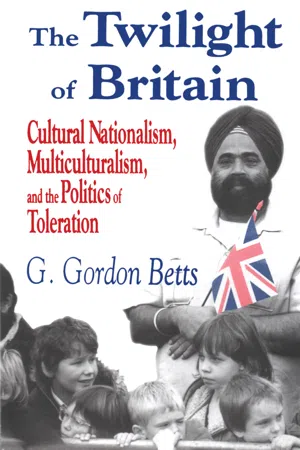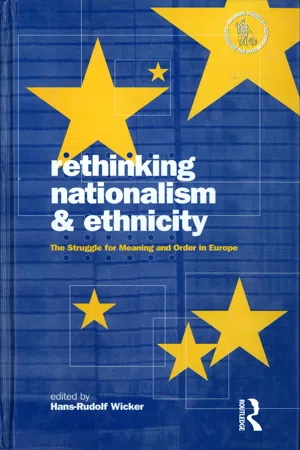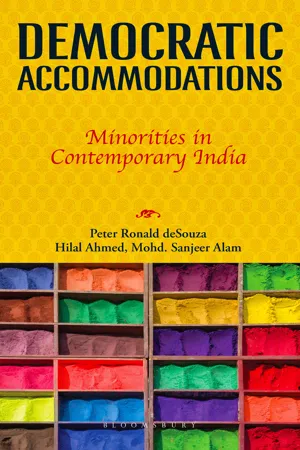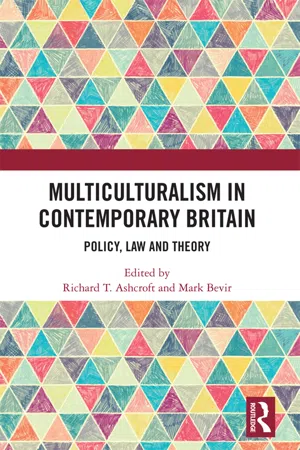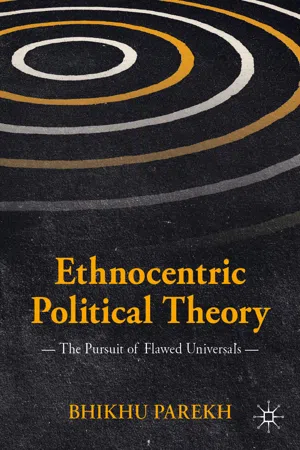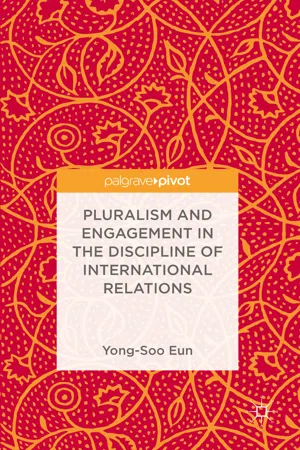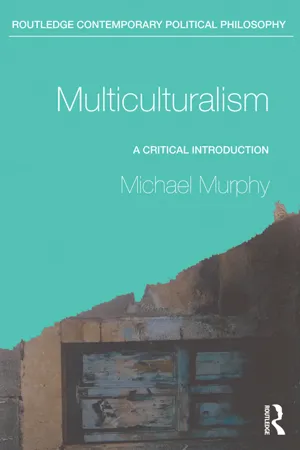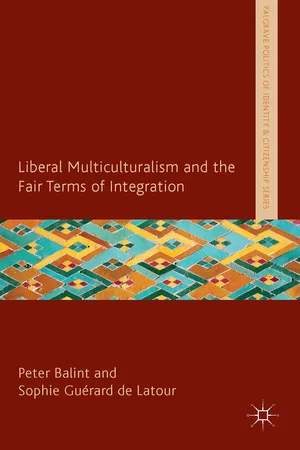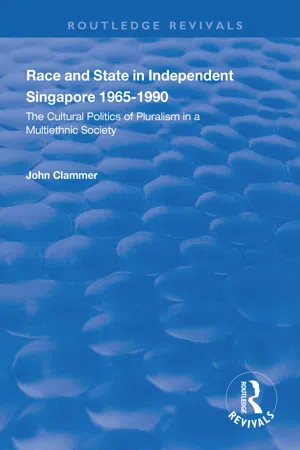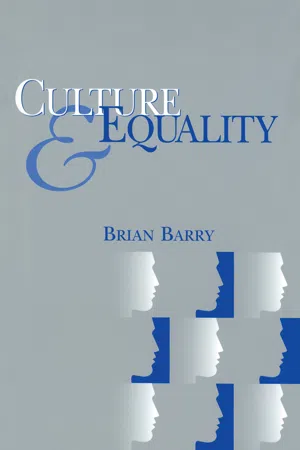Politics & International Relations
Pluralist Multiculturalism
Pluralist multiculturalism is a concept that emphasizes the coexistence of diverse cultural groups within a society. It promotes the idea that different cultures should be recognized and respected, and that no single culture should dominate. This approach encourages cultural diversity and aims to create a more inclusive and harmonious society by valuing and accommodating various cultural traditions and practices.
Written by Perlego with AI-assistance
Related key terms
Related key terms
1 of 4
Related key terms
1 of 3
10 Key excerpts on "Pluralist Multiculturalism"
- eBook - ePub
The Twilight of Britain
Cultural Nationalism, Multi-Culturalism and the Politics of Toleration
- G. Gordon Betts(Author)
- 2018(Publication Date)
- Routledge(Publisher)
5 Multiculturalism and the Politics of Identity Multiculturalism can become a feature of the politics of polarisation and difference, but one that may be presented in terms of the moral imperatives of equality and rights. A philosophical question is: what, if anything, should elevate the toleration of multiculturalism from being a political and sociological issue into a moral obligation? Multiculturalism is a general term that can mean different things to different people who understandably have a preference which particular version they envisage. A culturally pluralist society could co-exist stably, provided that the toleration is both received and offered by all its component groups, not just by the mainstream society. If this reciprocity is withheld whilst more toleration and rights are demanded, then public practices and political influence of minority cultures should not be automatically acquiesced to by the state. The term multiculturalism is a neologism that did not appear in the American press until about 1989. Politicians and most writers on the subject do not define it or assume that everyone knows what it means. It is an umbrella term that covers different types of cultural pluralism—a multicultural society is one made up of diverse ethno-national cultures. The exact form it takes differs from country to country depending on the origin, history, and nature of its particular cultural pluralism. The term multicultural as used in this discussion refers to significant sectarian cultural diversity and difference arising from race, ethnicity, and/or religion. There is no single global model of a multicultural society, and it is unlikely that any particular experience can be translated, at least in its entirety, to other situations in the world, so generalisations have to be considered with this in mind. Michael Walzer [1992:168 and 170] observes on the ‘“new tribalism’… - eBook - ePub
Rethinking Nationalism and Ethnicity
The Struggle for Meaning and Order in Europe
- Hans-Rudolf Wicker(Author)
- 2020(Publication Date)
- Routledge(Publisher)
2 Even if the premises are very different, the same conclusions may be reached by following a communitarian (Taylor, 1994) or postmodern approach (Young, 1990; Mouffe, 1994). It would seem that in theory the politics of recognition - if well understood - may be an important way to regulate the social and political dynamic of multiculturalism. I believe that the theory of citizenship offers some interesting insights into improving our understanding of this type of social and political regulation, namely a space within which there is room for diverse and even conflicting understandings of individuality, community and public identity.2 . ’Liberals should accept a wide range of group-differentiated rights for national minorities and ethnic groups, without sacrificing their core commitment to individual freedom and social equality’ (Kymlicka, 1995a: 126).The Specificity of Multiculturalism as a Social Fact
In social science literature, many concepts are used to express various sorts of cultural difference: multiculturalism, cultural pluralism, radical pluralism, pluralism, multinational, multiethnic, multiracial, multi-religious, multilinguistic, etc. Much confusion results from the fact that these notions are often used as synonyms. There are two basic concepts which are important to distinguish, namely plural society and multicultural society. Both express the idea that there is an under-lying conflict in society; however, they differ as to what this conflict is. For pluralist theorists, ‘as a consequence of diversity, … conflict is an inevitable aspect of political life, and political thought and practices tend to accept conflict as a normal and not aberrant feature of politics’ (Dahl, 1989: 218). Multicultural conflicts, on the contrary, are seen as potentially destructive (Taylor, 1994). They entail a social dynamic which is important in defusing and regulating. Thus, in multicultural societies, the conflicts are often harsher than in societies marked by the ‘fact of pluralism’ (Rawls, 1993).An implicit assumption underlying the pluralist conception of society is that conflicts basically concern individual or collective interests. As Connolly writes, from this perspective, ‘all major groups share a broad system of beliefs and values which encourages conflict to proceed within established channels and allows initial disagreements to dissolve into compromise solutions’ (1971: 3). Therefore, in a plural ‘society, conflicts arise within a given structure of political identities. Individuals and groups struggle among themselves in order to satisfy their respective interests. Nevertheless, they are presumed to accept the rules and the symbolic ‘intuitive ideas’ everybody agrees upon (Rawls, 1993) and which govern the democratic system. - eBook - ePub
Democratic Accommodations
Minorities in Contemporary India
- Peter Ronald deSouza, Hilal Ahmed, Mohd. Sanjeer Alam(Authors)
- 2019(Publication Date)
- Bloomsbury India(Publisher)
Chapter 1Assertive PluralismIntroduction: Pluralism and DemocracyMost nation-states in the contemporary world are characterised by multi-ethnic and multicultural populations. Even the so-called monocultural nations have now to accept the social fact that they are characterised by a multi-ethnic and multicultural present that produces social dynamics they cannot ignore. There are communities within them that have either disagreed with the majority culture and have hence seceded from it,1 or find it at variance from the one with which they have grown up, and hence consider it as a culture to be resisted. This social and demographic plurality has evolved because of many factors—long histories of changing or shifting territorial boundaries, occupation by foreign powers, growing economies especially after the Second World War where immigration was encouraged to meet labour needs, violent conflicts across the world from which people have fled, and most significantly, the legacies of colonial and imperial pasts. This last factor has given the erstwhile colonised people ‘some claims’2 against their colonial masters. It is a history that has produced new facts on the ground that is often neither recognised nor accepted3 by the erstwhile colonisers (Osborn, 2002). The emergence of national populations with varying ethnocultural characteristics has, as a result of these various historical processes, exposed today’s nations to a variety of issues.4As this plurality unfolds across the world we see ethnic and cultural conflicts emerging that are a consequence of the politics among different groups of ‘imagining the nation’ and of integrating minority groups within the wider society. This produces contests between individual and group rights. There are demands for recognition of these differences and for according group rights due to such differences. There is the acknowledgement that the growing inequality between majority and minority groups, over time, has a cumulative character. - eBook - ePub
Multiculturalism in Contemporary Britain
Policy, Law and Theory
- Richard T. Ashcroft, Mark Bevir(Authors)
- 2020(Publication Date)
- Routledge(Publisher)
In the British context, the most notable political theorists writing on multiculturalism have been Parekh (2000), Barry (2001) and Phillips (2007). Parekh endorses a form of multiculturalism based around intercultural dialogue between the different cultural groups that form a ‘community of communities’ within the UK. In contrast, Barry vociferously rejected multiculturalism on universalist liberal grounds in favour of a focus on redistribution. More recently, Phillips has called for a reconstituted feminist and non-essentialist ‘multiculturalism without culture’ which respects the agency of minority women. It should be noted, however, that none of these theorists advocate political autonomy for minority cultural groups to the extent that Kymlicka does, if at all.This brief survey of the discourses relating to multiculturalism in policy, law and theory foregrounds several key points. For instance, it is clear that the scope of the groups and issues that fall under the umbrella of ‘multiculturalism’ varies. Political theory has the broadest understanding of multiculturalism, seeing it as applying to national groups, indigenous peoples and immigrants, and as involving claims for all manner of rights and accommodations, including self-rule. Multiculturalism in law also has an extensive purview, affecting the procedure and substance of domestic and international law, often at the most fundamental level. The legal issues affecting sub-national groups are not, however, always framed in terms of multiculturalism, even if they turn on similar normative issues. Policy discourse is clearly the narrowest, dealing almost exclusively with issues relating to the integration of immigrant groups. Also, the ‘backlash’ against multiculturalism seems primarily to have occurred within public and policy discourse, rather than law and philosophy, although the theoretical literature has narrowed its focus in recent years. And lastly, all three discourses of multiculturalism are related to postwar processes of globalisation, particularly decolonisation, anti-racism, mass migration and human rights. - eBook - ePub
Ethnocentric Political Theory
The Pursuit of Flawed Universals
- Bhikhu Parekh(Author)
- 2019(Publication Date)
- Palgrave Macmillan(Publisher)
© The Author(s) 2019 Bhikhu Parekh Ethnocentric Political Theory International Political Theory https://doi.org/10.1007/978-3-030-11708-5_10Begin Abstract10. Reflections on Multiculturalism
Bhikhu Parekh1(1) Politics and International Relations, University of Hull, Hull, UKBhikhu ParekhEnd AbstractKeywords
Culture Integration Social cohesionIn recent years multiculturalism has been subjected to considerable criticism and held responsible for all sorts of ills such as social fragmentation, ghettoisation, lack of patriotism and even terrorism. The criticism is deeply misguided. It homogenises its target and ignores its internal diversity . Secondly, it gives a misleading account of multiculturalism and virtually borders on a caricature. I shall take each in turn.Multiculturalism appeared on the political and philosophical agenda of the West in the 1960s in response to the cultural diversity introduced by assertive national minorities, indigenous peoples, and the badly needed immigrants from the developing countries. Various views were canvassed about the proper response to diversity , multiculturalism being one of them. Multiculturalism developed, among other things, against the background of colonialism and the underlying ideology of a cultural hierarchy. It represented a reaction against and a rejection of cultural hierarchy, and implicitly or explicitly advocated cultural equality , meaning not so much the substantive equality of different cultures as their equal right to exist and flourish.Multiculturalism holds that the liberal society’s response to cultural diversity should be guided by three values that are central to it, namely liberty , equality and national unity. Minorities should not be subjected to coercive assimilation and should be free within the limits of the law to maintain their identity . They are entitled to equal treatment, and should not be subjected to discrimination and disadvantages on cultural grounds. Finally cohesion and stability of the receiving society requires that minorities should be integrated into it, become its valuable members like the rest and play their full part in it. The central concern or problematic of multiculturalism was how to combine diversity and unity without violating the liberty and equality of minorities. It was not about creating unity out of diversity because the wider society was already united, but rather about how to accommodate the new diversity within the existing unity. Although multiculturalism was initially conceived within the liberal framework, it acquired over time several new features drawn from other traditions, such as affirmative action and differentiated rights - Yong-Soo Eun(Author)
- 2016(Publication Date)
- Palgrave Macmillan(Publisher)
4Considering the positive and long-lasting plea for a pluralistic and inclusive mode of inquiry of international relations from various perspectives, in varying contexts, a group of scholars also discusses the nature of pluralism. “What kind” of pluralism should IR scholars embrace? This is the key question addressed by Tim Dunne, Lene Hansen, and Colin Wight in their recent article (Dunne et al. 2013 : 405–420); “integrative pluralism” is their answer. “Integrative pluralism” is an epistemological position that embraces “theoretical diversity as a means of providing more comprehensive and multi-dimensional accounts of complex phenomena.” To put it simply, this type of pluralism aims to bring about “more diversity” and “more interaction” through dialogue and engagement with alternative views and accounts where “research interests overlap” (Dunne et al. 2013 : 407, 416–417). In the context of promoting “Global IR,” Acharya (2014 : 620) also maintains that, “through dialogue and discovery,” it is possible to design an IR that is more “inclusive of non-Western worlds.” He further claims that it is “timely and essential” to have “dialogue” over questions about “what to study, how to study and even where to study IR” so as to ameliorate “the current [Western-centric] parochialism and ethnocentrism of ‘International Relations.’” In a related vein, Kimberly Hutchings (2011 ) ponders the concept of “dialogue” in the context of the West/non-West distinction. Taking issue with ethnocentrism in IR and levying a critique against Socratic and Habermasian notions of dialogue, Hutchings (2011 : 639, 647) suggests that “conversations between multiple, fractured self-identities which acknowledge the imperfect … nature of the insights that they generate” can lead to expansion of “the parameters of our disciplinary imaginations.” Other critical IR scholars also recognize the importance of dialogue and engagement. For instance, they claim that “postcolonial thought”, which problematizes the “coloniality” of power and knowledge (Mignolo 1992 ) and embraces diverse cultural mappings and sensitivities, is the key to activating “global dialogue” in the discipline (Shilliam 2011 ; Pasha 2011- eBook - ePub
Multiculturalism
A Critical Introduction
- Michael Murphy(Author)
- 2013(Publication Date)
- Routledge(Publisher)
This process of assimilation and absorption, which Walker Connor describes as majority nation-building through minority nation-destroying, would eventually become a standard feature of political development and state formation in the nineteenth and early twentieth centuries (Connor 1999: 29–66; Kymlicka 2001: 229–34). A generation of liberal modernization theorists writing in the 1950s and 1960s also welcomed the assimilation of ethnocultural and ethnonational minorities as a necessary by-product of the forward march of economic development and democratic consolidation, as did the architects of the post-second world war liberal international order, who viewed minority rights and strong minority identities as a threat to peace and stability both within and between states (Moreno 2001: 201–2; Anaya 2004; Harty and Murphy 2005: 41–3). Minority claims, it was hoped, could be satisfied by the extension of universal individual human rights and the benefits of equal citizenship within the bounds of an indivisible sovereign state.However, as we know already from the discussion in Chapter 4 , many nationalizing states have not been able to effect the total erasure of minority identities, or to prevent individuals or groups from mobilizing around these identities politically. Indeed, multicultural political philosophy was in many ways a response to the limited success of majority nation-building in practice. Initially, multiculturalists advanced their case almost exclusively in moral terms, and spent the bulk of their energies arguing against the perceived injustices of the liberal-assimilationist model of nation-building. In contrast, the potential impact of minority rights and group-differentiated citizenship regimes on things like stability, societal integration and national unity received hardly a mention in this early literature (see e.g. Kymlicka 1989; Young 1990; and Taylor 1992).4 Nevertheless, this period of inattention proved to be fairly short-lived, and the champions of multiculturalism were soon called upon to respond to a very powerful critique of multicultural policies that focused precisely on the threat they posed to the social bases of citizen solidarity in a democratic society. It is to this critique that I now turn.According to the critics, multicultural policies are corrosive of social solidarity in several different ways, and they work their effect on the dispositions of members of both minority and majority cultures. One argument is that multicultural policies promote a form of ethnic ghettoization that encourages the members of different cultural groups to retreat behind the boundaries of their own group based identities, to focus on what divides them from their fellow citizens rather than on what they have in common, and to orient their interests and their allegiances inward towards the group rather than outward towards the broader national community of which they are a part (Cairns 1993: 200; Miller 1995: 153–4; Beiner 1995: 6, 192–3, 2003: 211; Barry 2001: 79–80).5 - P. Balint, S. Guérard de Latour, P. Balint, S. Guérard de Latour, Kenneth A. Loparo, P. Balint, S. Guérard de Latour, Sophie Guérard de Latour(Authors)
- 2013(Publication Date)
- Palgrave Macmillan(Publisher)
I begin the chapter by showing how the confusion maintained by some advocates, as well as by many detractors, between ‘multiculturalism’, ‘politics of identity’ and ‘theories of recognition’ – in what I label ‘differentialist’ multiculturalism – is open to strong criticism: the theoretical framework of differentialist multiculturalism does not embody the notion of equality, which is, however, paramount for the achievement of racial justice. I then show that a minimal, more explicitly liberal version of multiculturalism yields to unavoidable essentialisation and naturalisation of cultural groups. Since anti-racism relies on the affirmation of the constructed character of ‘races’, multiculturalist theory turns out to be unable to formulate fundamental principles of racial justice. From the perspective of racial justice, racial groups are significant only for historical reasons and in non-ideal societies, and the only reason justice should care for such groups is to carry out their deconstruction. To achieve racial justice means to de-racialise society. In multiculturalist theory racial groups, instead of being deconstructed, are assimilated into cultural groups, ending up non-historically or transhistorically confirmed in the name of respect. Thus, multiculturalism risks leading only to a simple reformulation in cultural terms of the inequalities and domination that had historically been established and justified in terms of race. If multiculturalist theory is to conceptually accompany racial justice, the status of ‘cultural group’ needs clarification. Indeed, multicultural policies, if properly distinguished from anti-racial policies, can still be useful instruments of integration: they pursue a goal that is not necessarily at odds with racial justice – that of sustaining the value of cultural diversity. Yet racial justice cannot be reduced to multiculturalism and, in terms of political strategy, the implementation of policies of racial justice appears to be more effectively justified without recourse to a multiculturalist argument.Differentialist multiculturalism: equality versus identityA major confusion in a large part of the literature on multiculturalism needs addressing before the relationship between multiculturalism and anti-racism can be assessed. This confusion rests on the relations between three varieties of the philosophical position that faced the challenge posed to theories of justice by the existence of (cultural) groups in contemporary pluralist societies. Brian Barry (2001, p. 5), for example, notes that:Those who advocate the politicization of (cultural) group identities start from a variety of premises and finish up with a variety of policy prescription. Nevertheless, there is enough overlap between them to make it feasible to discuss them within a single book. The views in question are known as the politics of difference, the politics of recognition, or, most popularly, multiculturalism.- eBook - ePub
Race and State in Independent Singapore 1965–1990
The Cultural Politics of Pluralism in a Multiethnic Society
- John Clammer(Author)
- 2019(Publication Date)
- Routledge(Publisher)
4Multiculturalism and the Cultural Politics of Pluralism
The latter part of 1988 saw the introduction into Singapore life of the proposal that a “National Ideology”, similar in concept if not in content to Indonesia’s “Pancasila”, be created to provide a sense of identity to carry the nation into the next century. Amongst the values that were suggested as essential to social cohesion and as reflecting a truly Singaporean identity, a recurring one was that of multiracialism. It is, of course, already widely accepted that Singapore is fundamentally plural and is likely to always remain that way. But what this pluralism means in practice is a question rarely raised publicly, and enshrining it in a “National Ideology” is a meaningless gesture unless this question is answered in detail. Indeed the theme of this chapter was suggested to me by a Sri Lankan scholar who, on reading an earlier paper of mine on the success of ethnic policies in Singapore, commented that the situation in Singapore as I described it would, with some obvious modification, have fitted Sri Lanka only a few years ago but who concluded his observation. “But just look at us now”. This observation prompted me to consider the extent to which an ideology can in itself bring about the conditions that it wishes to regard as normative. The chapter that follows is a reflection on this theme, taking as its empirical case-study the present and future state of ethnic relations in Singapore. This is an important question, since the social fabric of Singapore, seemingly so firm and well-constructed, is actually very fragile indeed. The identification of the interplay between ideological factors and objective sociological ones can hopefully only contribute to the improvement of the already remarkable ethnic balance that Singapore has to date achieved. - eBook - ePub
Culture and Equality
An Egalitarian Critique of Multiculturalism
- Brian Barry(Author)
- 2013(Publication Date)
- Polity(Publisher)
The ‘politics of difference’ thus rests on a rejection of what we may call, in contrast, the politics of solidarity. On this alternative conception of politics, sketched in chapter 3, citizens belong to a single society and share a common fate. Political disagreements, according to this approach, stem from differing ideas among citizens about the direction to be taken in future by their society. We may expect them to disagree on the policies that will most effectively further the common good and most fairly distribute the benefits and burdens arising from the working of their common institutions. If we conceive of political conflict as predominantly taking this form, we have a clear prima facie case for resolving disputes by adopting the policy favoured by the majority. In matters of common concern, it is hard to see why each person should not have an equal say in the outcome. Where a minority is constituted out of those who are on the losing side in a disagreement about the future of the institutions they share with the majority, there appears to be no case for building in special protections for the minority. It would surely be absurd to say that a minority defined in this way should have a veto on the policy favoured by a majority, or that its members should be able to demand that the policy with which they disagree should not apply to them.This way of looking at politics is altogether different from the one characteristic of multiculturalists. For them, there is ‘no such thing as society’ – not in the sense intended by Margaret Thatcher (who added that there were only individuals and families) but in the sense that a society is to be conceived of as a fictitious body whose real constituents are communities. We saw in chapter 5 how the English pluralists in the early years of the twentieth century argued that communities were a valid source of authority and should share sovereignty with the state. Prior to that, in chapter 3, we came across Horace Kallen, the opponent of the ‘melting pot’ ideal who maintained in the 1920s that ethnically defined communities were destined (apparently by biology) to go on reproducing cultural differences into the indefinite future, and drew from this the conclusion that they should be seen as the building-blocks of society. Throughout the book, we have seen these ideas echoed in the work of contemporary multiculturalists, for whom group identities and group loyalties have primacy over any broader, society-wide identity and loyalty. Bhikhu Parekh, whose ideas I discussed in chapters 2 and 3, is an excellent example. Similarly, Iris Young has suggested that ‘in the twentieth century the ideal state is composed of a plurality of nations or cultural groups, with a degree of self-determination and autonomy compatible with federated equal rights and obligations of citizenship’.36
Index pages curate the most relevant extracts from our library of academic textbooks. They’ve been created using an in-house natural language model (NLM), each adding context and meaning to key research topics.
Explore more topic indexes
Explore more topic indexes
1 of 6
Explore more topic indexes
1 of 4
